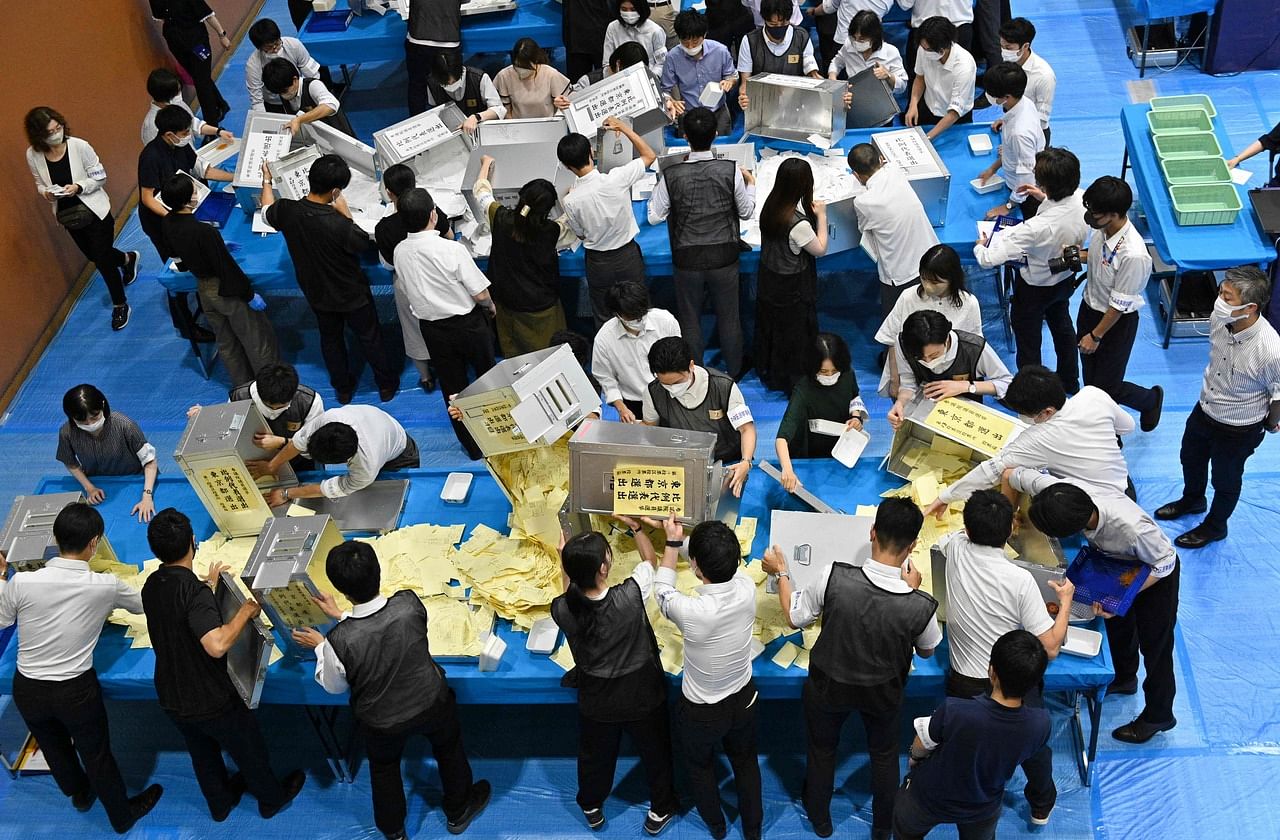Japan's LDP wins big in Upper House election after Abe's assassination
Sign up now: Get insights on Asia's fast-moving developments

Japanese PM Fumio Kishida placing a paper rose on an LDP candidate's name to indicate a victory in the Upper House election.
PHOTO: AFP
TOKYO - Japan's ruling Liberal Democratic Party (LDP) and its coalition partner won a convincing majority in the Upper House of Parliament in an election on Sunday (July 10), two days after former prime minister Shinzo Abe was killed at a campaign rally.
The LDP and its junior coalition partner Komeito won 76 seats, results from national public broadcaster NHK showed early on Monday.
This was well above the 56 seats they needed to retain their majority and the 69 seats they needed to increase their size in the body.
Japanese stocks climbed on Monday, with the Topix Index gaining as much as 1.6 per cent, in line with gains after each of the past three upper house elections where the ruling coalition retained a majority.
Upper House lawmakers serve six-year terms, with elections held every three years for half of the 248-seat chamber. There were 545 candidates in Sunday's poll, which included one seat to fill a vacancy.
A record 35 women were elected this time, according to the Tokyo Shimbun newspaper, compared with 28 in the last upper house election.
Prime Minister Fumio Kishida, speaking at the LDP headquarters on Sunday night, said there was "major significance" in successfully holding an election just two days after Mr Abe's assassination.
"It is proof that we will not bow down to terrorism," he said, having earlier observed one minute of silence in memory of Mr Abe, 67.
The resounding mandate will allow Mr Kishida to follow through on his policy pledges, including creating a "new form of capitalism" and doubling Japan's defence spending.
"I want to bring results for the new type of capitalism that I have been promoting," said Mr Kishida. "We will take steps to address the pain from inflation and also seek to raise wages."
Sunday's election also gave Mr Kishida the numbers in the Upper House to pursue Mr Abe's unfulfilled dream of revising the pacifist Constitution for the first time since it was enacted in 1947.
This will require the support of two-thirds of both the Lower and Upper Houses - numbers that the LDP-Komeito coalition has with the pro-revision opposition parties Nippon Ishin no Kai (Japan Innovation Party) and the Democratic Party for the People.

While the parties differ slightly on how to amend the document, Mr Kishida on Sunday night vowed to bridge these gaps and put together a Bill before Parliament.
The revision will also need a majority in a public referendum.
LDP policy chief Sanae Takaichi, a protege of Mr Abe, said she will ardently work towards revising the charter "as soon as possible".
While it was impossible to gauge the direct impact of the shocking murder of Mr Abe on the election, analysts noted that the apparent effect was limited.
Voter turnout was estimated at 52.16 per cent, which was up 3.36 percentage points from the 48.8 per cent in the Upper House poll in 2019 but lower than the 54.7 per cent in 2016.
And while the LDP gained seats - it was forecast to win at least 60 seats, up from its pre-election strength of 55 among the contested seats - analysts said this was primarily due to a disjointed opposition that failed to unify candidates unlike in 2019, leading to a split vote in many districts.
Mr Abe, Japan's longest-serving prime minister, was gunned down last Friday during a stump speech for LDP incumbent candidate Kei Sato in the western city of Nara.
"On the eve of the election, I campaigned to overcome terrorism without flinching or being cowed," Mr Sato said after his victory was assured. "I will go to Tokyo tomorrow to firmly report the results to former prime minister Abe."
The gunman, Tetsuya Yamagami, 41, said he targeted Mr Abe in his belief that the former PM was linked to a "religious group" which his mother had joined, paying exorbitant dues that left his family bankrupt and broken. Politicians condemned the killing as an "attack on democracy".
The turnout, Sophia University political scientist Koichi Nakano told The Straits Times, suggested that the message that democracy was threatened had not resonated with many voters, whose apathy did not draw them to ballot boxes.
Upper House elections are seen as a referendum on the sitting government. In 2007, with Mr Abe as PM, the LDP suffered a sound defeat that led to his resignation.
Mr Abe's death may now free Mr Kishida to emerge from his former boss' shadow.
Although he was no longer PM, Mr Abe wielded outsized influence as leader of the LDP's largest faction.
Mr Kishida's prized "new form of capitalism" policy to help the poor and sandwiched class ended up looking similar to Mr Abe's namesake Abenomics policy that stimulated the economy but widened income disparity.
"Within the LDP, Abe was the most enthusiastic about keeping ultra-loose monetary policy, and opposed Kishida's more balanced fiscal policy ideas," political scientist Mikitaka Masuyama of the National Graduate Institute for Policy Studies told ST.
"Kishida now can realise what he has been promising to do."


